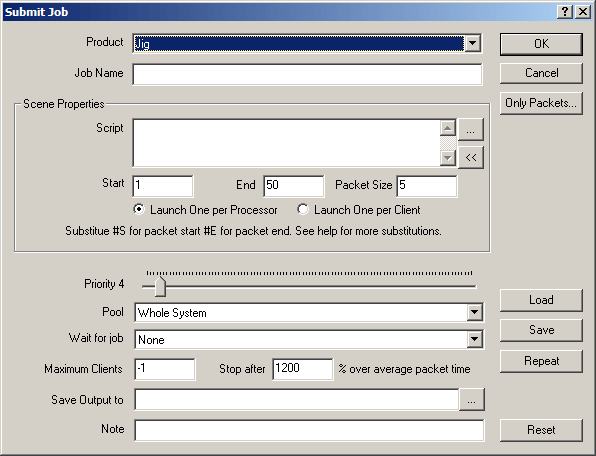
| Smedge has moved on. Now you can get the ease of use of Smedge 2 with the power of Smedge 3 in the new Smedge. Check out the Smedge Downloads page to download the updated Smedge for Windows, Mac, or Linux and get started right away. |
Überware
<info@uberware.net>
©2000-2009 Überware. All rights reserved.
Smedge2
| HOME | PURCHASE | DOWNLOAD | MANUAL | FAQ | ISSUES |
|
NUMBER 37.3 16 September, 2004 |
Products Available To Render
Jig
Jig is a copy of the Generic Script interface, and has the same features and abilities. It was created this way because the user that requested it needed this flexibility. Be sure to type the entire commandline you want to render just as if you were using the Generic Script render type.
To create a Jig job via commandline, you can use the following parameters for the -product switch (case is ignored):
JigEssentially, Smedge is a giant system that does nothing but distribute command lines. As long as the client knows how to interpret the command line, you can distribute any command line based application. Smedge provides some shortcuts that you can put into your commandlines that get replaced in order to make it more useful.
#S and #0S Provide a way to give the start frame of the packet to the command line. #S is replaced by the frame number, and #0S (that's a zero in front of it) is replaced by a four digit padded version of the frame number. #E and #0E Provide a way to give the end frame of the packet to the command line. #E is replaced by the frame number, and #0E (that's a zero in front of it) is replaced by a four digit padded version of the frame number. #B and #0B Provide a way to give the packet size to the command line. #B is replaced by the packet size, and #0B (that's a zero in front of it) is replaced by a four digit padded version of the packet size. #A and #0A Provide a way to give the first frame of the job to the command line. #A is replaced by the first frame. #0A (that's a zero in front of it) is replaced by a four digit padded version of the first frame. #Z and #0Z Provide a way to give the last frame of the job to the command line. #Z is replaced by the last frame. #0Z (that's a zero in front of it) is replaced by a four digit padded version of the last frame. #P Provides a way to give the number of processors Smedge is assigning to this task to the command line. Generic scripts still allow you to set the job to either single or multi-threaded. However, since Smedge doesn't know anything about the program being called, it is up to you to make sure that you set up both your command line and your Smedge job to optimize processor usage. Essentially, if a job is set to single threaded, this value will be one, but if a job is set to multi-threaded, this value will be the number of processors available to Smedge on the client.
